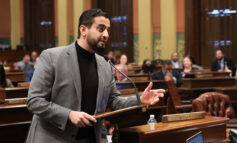
|
| Panelists lead the discussion after the showing of “He Named Me Malala” |
DEARBORN — One child, one teacher, one book and one pen can change the world, said Malala Yousafzai, the Pakistani teenager who was shot by the Taliban at age 15 for speaking out about the need for girls’ education.
“He Named Me Malala” recounts the Taliban attack in Pakistan and provides a glimpse into Yousafzai’s life after — from her close relationship with her father to the activism that earned her the Nobel Peace Prize in 2014.
The documentary, which has been shortlisted for an Oscar at the 2016 Academy Awards, was shown at the Arab American National Museum on Saturday, Dec. 5 and followed by a discussion. Panelists spoke about parallels between their experiences and Yousafzai’s, as well as the larger issues of education and traditions that marginalize women in the local community, the Middle East and South Asia.
Hanan Yahya, a University of Michigan senior majoring in social theory and practice, said she shares Yousafzai’s desire for education.
Yahya emigrated from Yemen with her family when she was 3 years old. She came to the United States and grew up in southwest Detroit. Although she and many of her classmates had a lot of potential, they didn’t have a clear path to move beyond the community, she said.
“When you’re deprived of something that’s so natural and needed in your life…you develop that passion that nobody can stop you,” Yahya said of education. “It becomes a fire. That fire is continuously blazing in my life.”
Zainab Zeb Khan, an activist and president of the Muslim American Leadership Alliance, arranged the event and moderated the conversation. The program was part of Students Stand With Malala, which aims to inspire students and teachers across the country to spread Malala’s message.
Along with Yahya, Fatima Salemassi, director of the World Languages Program at Madonna University, and Afaf Ahmad, editor-in-chief of Americana Magazine, were panelists.
Ahmad said the documentary highlighted several important questions.
“We as parents, do we have the courage to be like Malala’s father?” Ahmad asked. “Can we teach our children to be outspoken, no matter what the surroundings are?”
Yousafzai’s father encouraged his daughter to raise her voice, though he knew it could endanger both of them. In the film, Yousafzai credited her father with instilling in her a value for women’s rights.
“Men are the champion of change in this issue for gender disparity,” Khan said. “Men are equally part of the solution.”
“He Named Me Malala” was directed by Davis Guggenheim. A vote will trim the list of Oscar nominations from 15 to the final five and the winner will be announced at the Academy Awards ceremony on Feb. 28.






Leave a Reply